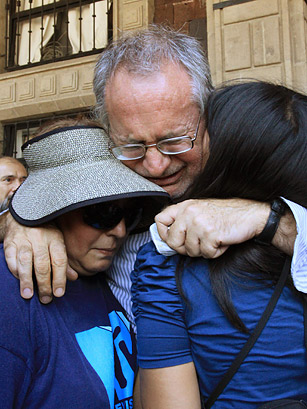
The image of seven corpses of young men and women who had been tortured, murdered and dumped in a car was depressingly familiar in drug war torn Mexico. But unlike thousands of other killings, one victim of last week’s multiple homicide in the spa town Cuernavaca had a well-known father and his grief gained national attention.
The journalist and poet Javier Sicilia led a march to commemorate the death of his son and friends, who appear to be an innocent victims caught up in the violence. In the media spotlight, Sicilia said what has been on the mind of many weeping parents. The war on drugs is not working, he cried, the government has to make a truce with cartels. “Drug trafficking goes on. The United States doesn’t care, and is not helping us at all,” Sicilia told reporters. “The mafias are here. We should make a pact.”
Most historians of Mexico argue that the tactic of awarding turfs was employed during the 71-year rule of the Institutional Revolutionary Party or PRI, keeping the country relatively peaceful until the party lost power in 2000. However, PRI leaders deny this claiming that they were simply better at combating crime. Opinion polls show that the PRI is the current favorite to win back the presidency in 2012, helped by many voters who feel it was safer back in the days of one party rule. The PRI’s record and policy on drug cartels will likely come under much discussion in the run up to the race.
But many are calling for a change in drug war tactics whoever wins in 2012. Historian Lorenzo Meyer says a public debate about a pact with cartels is long overdue. “The current policy has created violence and chaos that leaves citizens totally unprotected,” Meyer said. “A new government could say that there will be no war on drugs in Mexico if there isn’t one in the United States. The U.S. government is not stopping drug use, or the flow of weapons or money laundering.” American operatives in the drug war have been among the biggest fans of Calderon’s offensive. On Tuesday, DEA administrator Michele M. Leonhart praised Calderon for standing firm against cartels while in a conference in the resort of Cancun. Leonhart also emphasized how Calderon pursues “a war without truce” — an apparent stab at Sicilia’s comments.
Nevertheless, this year American citizens have been increasingly feeling the pinch of the violence. An American missionary was shot dead in Mexico in January while gunmen slew a U.S. customs agent in February. And on Monday, assailants shot dead two Americans at a border crossing in Tijuana. Motives are unclear in much of the violence that has swept Mexico, including the murder of the seven in Cuernavaca and the discovery on Wednesday of a mass grave with at some 40 bodies in Tamaulipas.
Sicilia’s son Francisco was a 24-year old student with no criminal record. According to reports in local newspapers, Francisco Sicilia went with friends to a bar, where they had a loud conversation about the drug violence. Leaving the bar, one of the group reportedly called a family member to say they were being followed. Their bodies were later found in the car next to a note that said, “This is what happens to those who make anonymous calls to soldiers.” In the fog of the drug war, the clues point in many directions. Sources quoted by La Jornada newspaper on Tuesday said that rogue soldiers are now suspected in the killing.
Sicilia says there are no words to describe the grief of losing a son. “This pain has no name because it is unnatural,” Sicilia wrote in an open letter addressed to politicians and criminals. “From this suffering, from this indignation that these deaths have caused, we are f—– sick of it.”
See pictures of Mexico’s drug wars.
See TIME’s Pictures of the Week.